Students in Professor Randall Abate’s Ocean and Coastal Law and Policy class recently delivered final presentations on issues they selected to concentrate on throughout the semester. Among them were Michelle Etienne who focused on whether local beach badge fees were consistent with the public trust doctrine, and Samantha Pawlik, who explored how New Jersey’s offshore wind farms will impact marine life. Learn about their findings in the Q&A and presentation slides below.
Presentation Title: “N.J. Beach Access: Do Beach Badges Violate the Public Trust Doctrine?”
 Student Researcher: Michelle Etienne
Student Researcher: Michelle Etienne
Year and Major: Senior, Music Industry
View slides (PDF, 1MB)
What is the public trust doctrine and how does it relate to beach badge fees?
The public trust doctrine is the principle that certain natural and cultural resources are preserved for public use, and that the government owns and must protect and maintain these resources for the public’s use. It originates from Roman law, was established in English Common law, and was adopted in the U.S. in state law. In New Jersey, the public trust doctrine applies to tidal waterways and their shores in the state and establishes that citizens have the right to fully utilize these lands and waters for a variety of public activities that must be protected. These public activities include navigation, commerce, fishing, swimming, bathing, sunbathing, and walking along tidal waterways and their shores. At the beach, the land that reaches the mean high waterline (wet sands) is public trust land managed by the state.
The public trust doctrine in New Jersey requires the state and local governments to ensure adequate access to public trust sites (i.e. the wet sands and open water). There must be adequate linear/lateral access, perpendicular access, and visual access to these public trust lands. This is where beach badges play a role. In order to access the dry private sands, and ultimately the public sands, many New Jersey beaches charge a fee. At each vertical and horizontal access point on the beaches, badge checkers await to make sure that beachgoers have paid a fee to access the beach for the day. The question is whether this practice of charging a fee to access private land and ultimately public land is permissible under the public trust doctrine.
Do you believe charging the public to use the beach violates the spirit of the public trust doctrine? Why or why not?
As a Jersey Shore resident, I am accustomed to having to purchase my seasonal beach badge each summer and the concept of beach badges has never seemed odd to me. However, in researching the PTD and the history of beach badges on the Jersey Shore, I believe that this practice violates the PTD.
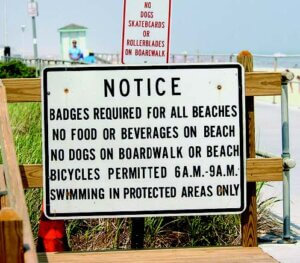 Beach badges were first introduced by the town of Bradley Beach in 1929 for the sole purpose of limiting beach access to only town residents and visitors in town hotels. But it quickly was recognized as a revenue-generating method and many beach towns followed suit. In 1972, in the landmark case of Borough of Neptune v. Avon-by-the-Sea, Avon-by-the-Sea attempted to charge less for badges for town residents and more for out-of-town residents to access its beaches. The court held that municipalities may not discriminate against nonresidents with badge fees. Although this case established that there may not be any discrimination in pricing, badge fees still restrict some people from being able to go to the beach. These fees also have no limit to how much they can be increased each year. In Avon-by-the-Sea alone, daily badge fees went up by $3 in just two years and a regular adult season badge increased by $10. Although these badge fees are the same for everyone, these fees are becoming more expensive, ultimately making it less affordable for some New Jersians to access the beach. This reality undermines the goals of the public trust doctrine and the duty that state and local governments have to ensure adequate access to public trust lands.
Beach badges were first introduced by the town of Bradley Beach in 1929 for the sole purpose of limiting beach access to only town residents and visitors in town hotels. But it quickly was recognized as a revenue-generating method and many beach towns followed suit. In 1972, in the landmark case of Borough of Neptune v. Avon-by-the-Sea, Avon-by-the-Sea attempted to charge less for badges for town residents and more for out-of-town residents to access its beaches. The court held that municipalities may not discriminate against nonresidents with badge fees. Although this case established that there may not be any discrimination in pricing, badge fees still restrict some people from being able to go to the beach. These fees also have no limit to how much they can be increased each year. In Avon-by-the-Sea alone, daily badge fees went up by $3 in just two years and a regular adult season badge increased by $10. Although these badge fees are the same for everyone, these fees are becoming more expensive, ultimately making it less affordable for some New Jersians to access the beach. This reality undermines the goals of the public trust doctrine and the duty that state and local governments have to ensure adequate access to public trust lands.
What are some ways that the state or municipalities can better uphold the rights granted in the public trust doctrine?
Many shore towns argue that badge fees are necessary to their town budget. The towns reinvest these revenues to help maintain the beaches for public use. While towns need to have adequate funding for beach maintenance, I have two suggestions that I believe would help towns raise adequate funds for beach maintenance while upholding the rights granted in the PTD.
My first suggestion is for the state to establish a percentage limit on the amount a town can increase its badge fees per season. Towns would need permission from the state to increase fees above these levels. This would ensure that towns aren’t increasing these fees too quickly and that they have legitimate, strong reasoning for these increases that are beneficial to the maintenance of public trust lands. My next suggestion is that all beach towns adopt a “Beach Utility,” which is a committee of town elected officials that dedicates all revenue derived from beach badge sales back into the maintenance of the beach. This would ensure that the money made from badge sales is used exclusively to maintain the private and public beach lands.
Presentation Title: “Implementing Safeguards for New Jersey Offshore Wind Projects to Address Impacts to Marine Life”
 Student Researcher: Samantha Pawlik
Student Researcher: Samantha Pawlik
Year and Major: Senior, Political Science
View Slides (PDF, 1MB)
Your presentation examined the issue of offshore wind energy off the New Jersey coast. Where does progress on wind development stand in New Jersey today and what are the next steps?
New Jersey is currently approved to start construction of the nation’s largest combined offshore wind farm in 2024. The New Jersey Board of Public Utilities (NJBPU) awarded a combined 2,658 MW of offshore wind capacity to Ørsted’s Ocean Wind II and Shell’s Atlantic Shores Offshore Wind, bringing the state’s total planned capacity to over 3,700 MW. Gov. Phil Murphy signed Executive Order No. 92 in 2020, setting the goal of 7,500 MW of offshore wind by 2035. The federal government, led by the Bureau of Ocean Energy Management (BOEM), is responsible for identifying, leasing, and reviewing offshore wind areas and projects located between three and 200 nautical miles from the U.S. coast. BOEM will review and approve the construction and operation phases for the two projects, which includes environmental and technical reviews as well as design and implementation plans.
You discussed some of the risks that offshore wind projects pose to marine life, and cetaceans in particular. Can you describe what you found?
Although there is limited research on this topic, I was able to find enough information to conclude that offshore wind farms do have a significant impact on marine wildlife and their habitat. Excessive noise can affect marine wildlife behavior, particularly those species that are more sensitive to sound, that rely on their use of vocalization for communication, and those that use echolocation for navigation, such as cetaceans. Preconstruction activities of offshore wind farms include use of geosurveys that use high-energy acoustic sources to transmit sound, which creates an image of the seafloor. Construction requires a variety of sound-generating activities, including seismic exploration, excavation with explosives, dredging, ship and/or barge operations, and pile driving. Even during the operations phase of wind turbines, researchers have found that the slight vibrations that travel through the poles cause sound radiation through the seafloor. These activities all result in disturbances to marine habitat and can cause negative impacts to marine wildlife behavior and health.
What are some of the ways those risks could be mitigated on the technology and policy sides?
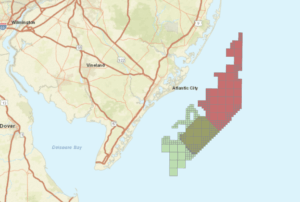 Mitigating these risks through technology and policy reforms is key to implementing such a large-scale project in a safe manner. Cutting-edge technology has been a crucial component in the construction of offshore wind farms. My project discussed suction bucket and gravity-based foundations, which are new technologies that can be used in place of monopile foundations as a quieter and less disruptive alternative during construction. Collaboration between agencies to provide efficient documentation of progress and findings, transparency of information with shore towns and public education on the projects, and continued research efforts are all key to attenuate the threats posed by offshore wind farms. Duke University recently received a $7.5 million grant from the U.S. Department of Energy (DOE) to assess the risks that offshore wind energy development along the East Coast may pose to birds, bats, and marine mammals. This type of research will help inform decisions and identify steps that can be taken to reduce harmful impacts on marine wildlife as offshore wind deployment increases.
Mitigating these risks through technology and policy reforms is key to implementing such a large-scale project in a safe manner. Cutting-edge technology has been a crucial component in the construction of offshore wind farms. My project discussed suction bucket and gravity-based foundations, which are new technologies that can be used in place of monopile foundations as a quieter and less disruptive alternative during construction. Collaboration between agencies to provide efficient documentation of progress and findings, transparency of information with shore towns and public education on the projects, and continued research efforts are all key to attenuate the threats posed by offshore wind farms. Duke University recently received a $7.5 million grant from the U.S. Department of Energy (DOE) to assess the risks that offshore wind energy development along the East Coast may pose to birds, bats, and marine mammals. This type of research will help inform decisions and identify steps that can be taken to reduce harmful impacts on marine wildlife as offshore wind deployment increases.
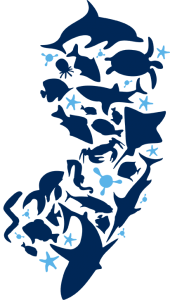 The Urban Coast Institute has awarded two spring Faculty Enrichment Grants for projects that will expand green teams in New Jersey schools and create art inspired by utopian societies that once existed in Jersey Shore communities.
The Urban Coast Institute has awarded two spring Faculty Enrichment Grants for projects that will expand green teams in New Jersey schools and create art inspired by utopian societies that once existed in Jersey Shore communities.


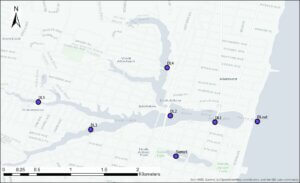
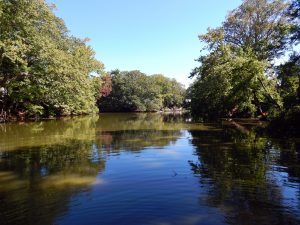
 The Urban Coast Institute (UCI) is seeking proposals from Monmouth University students and faculty members of all disciplines for grants to support summer research through its Heidi Lynn Sculthorpe Scholars program. Endowed scholarships for the 2022-23 school year are also available for Monmouth students with a demonstrated financial need and interest in coastal, marine, and environmental studies.
The Urban Coast Institute (UCI) is seeking proposals from Monmouth University students and faculty members of all disciplines for grants to support summer research through its Heidi Lynn Sculthorpe Scholars program. Endowed scholarships for the 2022-23 school year are also available for Monmouth students with a demonstrated financial need and interest in coastal, marine, and environmental studies.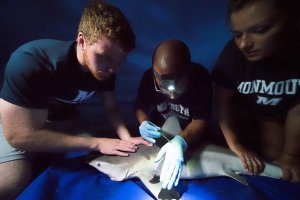 Summer research projects may be proposed by students with the support of a faculty mentor or proposed by a faculty member with the support of students who will work under their supervision. Students will have the opportunity present their work at the
Summer research projects may be proposed by students with the support of a faculty mentor or proposed by a faculty member with the support of students who will work under their supervision. Students will have the opportunity present their work at the 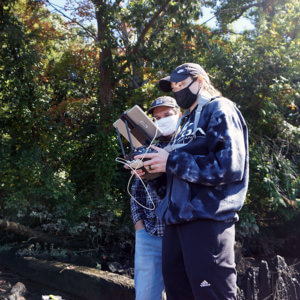 UCI Faculty Enrichment Grants support full-time faculty of any rank for individual or collaborative projects for the enhancement of existing curriculum, new curriculum development, research and scholarship, and team-teaching opportunities. Although all proposals relevant to the goals and objectives of the UCI will be accepted, the UCI is particularly interested in funding collaborative, multidisciplinary projects that address aspects of the climate crisis and advance diversity, equity, inclusion and justice.
UCI Faculty Enrichment Grants support full-time faculty of any rank for individual or collaborative projects for the enhancement of existing curriculum, new curriculum development, research and scholarship, and team-teaching opportunities. Although all proposals relevant to the goals and objectives of the UCI will be accepted, the UCI is particularly interested in funding collaborative, multidisciplinary projects that address aspects of the climate crisis and advance diversity, equity, inclusion and justice. This presentation compares Inuit and commercial hunting activities, highlighting the differences between the purpose, practices, and scale of these hunts. With the distinctions between the two practices made clear, it explores the historic and ongoing ways in which the commercial sealing industry and federal government have perpetuated the conflation of the two. By failing to acknowledge the differences between Inuit and commercial sealing practices, special interest groups have been complicit in perpetuating this conflation as well, although several of these groups have recently worked to clarify the distinction between the two. As a result of the muddied dialogue on commercial and Inuit sealing, both food security and the survival of culture and livelihoods has been compromised in Inuit communities. Despite these ramifications, some Inuit support the commercial hunt because of how anti-sealing campaigns have adversely affected Inuit hunters. At the same time, other Inuit believe that the industry constitutes a wrongful appropriation of their sacred cultural practice, and are seeking to reclaim the practice as their uniquely protected right.
This presentation compares Inuit and commercial hunting activities, highlighting the differences between the purpose, practices, and scale of these hunts. With the distinctions between the two practices made clear, it explores the historic and ongoing ways in which the commercial sealing industry and federal government have perpetuated the conflation of the two. By failing to acknowledge the differences between Inuit and commercial sealing practices, special interest groups have been complicit in perpetuating this conflation as well, although several of these groups have recently worked to clarify the distinction between the two. As a result of the muddied dialogue on commercial and Inuit sealing, both food security and the survival of culture and livelihoods has been compromised in Inuit communities. Despite these ramifications, some Inuit support the commercial hunt because of how anti-sealing campaigns have adversely affected Inuit hunters. At the same time, other Inuit believe that the industry constitutes a wrongful appropriation of their sacred cultural practice, and are seeking to reclaim the practice as their uniquely protected right. Sarah Levy is a Ph.D. candidate at the Faculty of Law, University of Oxford, where she is conducting research on the laws surrounding Canadian sealing activities. In her doctoral project, she is exploring the conflation of Inuit sealing practices and the commercial sealing industry, with a focus on the intersections of animal, environmental, and Indigenous rights in this context. Sarah has been called to the Bar of Ontario and held positions at the Ministry of Environment, Conservation and Parks at the Government of Ontario and Animal Justice Canada. She holds a B.A. (Hons) from Trinity College, University of Toronto in Ethics, Society, and Law and Environmental Studies, and a J.D. and Master of Environmental Studies from Osgoode Hall Law School at York University. She completed her master’s research on the topic of direct-action and international marine wildlife conservation laws, in which she explored the ways in which nongovernmental organizations fill the gap between law and enforcement where nation states fail to institutionalize conservation.
Sarah Levy is a Ph.D. candidate at the Faculty of Law, University of Oxford, where she is conducting research on the laws surrounding Canadian sealing activities. In her doctoral project, she is exploring the conflation of Inuit sealing practices and the commercial sealing industry, with a focus on the intersections of animal, environmental, and Indigenous rights in this context. Sarah has been called to the Bar of Ontario and held positions at the Ministry of Environment, Conservation and Parks at the Government of Ontario and Animal Justice Canada. She holds a B.A. (Hons) from Trinity College, University of Toronto in Ethics, Society, and Law and Environmental Studies, and a J.D. and Master of Environmental Studies from Osgoode Hall Law School at York University. She completed her master’s research on the topic of direct-action and international marine wildlife conservation laws, in which she explored the ways in which nongovernmental organizations fill the gap between law and enforcement where nation states fail to institutionalize conservation. Student Researcher: Michelle Etienne
Student Researcher: Michelle Etienne Beach badges were first introduced by the town of Bradley Beach in 1929 for the sole purpose of limiting beach access to only town residents and visitors in town hotels. But it quickly was recognized as a revenue-generating method and many beach towns followed suit. In 1972, in the landmark case of Borough of Neptune v. Avon-by-the-Sea, Avon-by-the-Sea attempted to charge less for badges for town residents and more for out-of-town residents to access its beaches. The court held that municipalities may not discriminate against nonresidents with badge fees. Although this case established that there may not be any discrimination in pricing, badge fees still restrict some people from being able to go to the beach. These fees also have no limit to how much they can be increased each year. In Avon-by-the-Sea alone, daily badge fees went up by $3 in just two years and a regular adult season badge increased by $10. Although these badge fees are the same for everyone, these fees are becoming more expensive, ultimately making it less affordable for some New Jersians to access the beach. This reality undermines the goals of the public trust doctrine and the duty that state and local governments have to ensure adequate access to public trust lands.
Beach badges were first introduced by the town of Bradley Beach in 1929 for the sole purpose of limiting beach access to only town residents and visitors in town hotels. But it quickly was recognized as a revenue-generating method and many beach towns followed suit. In 1972, in the landmark case of Borough of Neptune v. Avon-by-the-Sea, Avon-by-the-Sea attempted to charge less for badges for town residents and more for out-of-town residents to access its beaches. The court held that municipalities may not discriminate against nonresidents with badge fees. Although this case established that there may not be any discrimination in pricing, badge fees still restrict some people from being able to go to the beach. These fees also have no limit to how much they can be increased each year. In Avon-by-the-Sea alone, daily badge fees went up by $3 in just two years and a regular adult season badge increased by $10. Although these badge fees are the same for everyone, these fees are becoming more expensive, ultimately making it less affordable for some New Jersians to access the beach. This reality undermines the goals of the public trust doctrine and the duty that state and local governments have to ensure adequate access to public trust lands. Student Researcher: Samantha Pawlik
Student Researcher: Samantha Pawlik Mitigating these risks through technology and policy reforms is key to implementing such a large-scale project in a safe manner. Cutting-edge technology has been a crucial component in the construction of offshore wind farms. My project discussed suction bucket and gravity-based foundations, which are new technologies that can be used in place of monopile foundations as a quieter and less disruptive alternative during construction. Collaboration between agencies to provide efficient documentation of progress and findings, transparency of information with shore towns and public education on the projects, and continued research efforts are all key to attenuate the threats posed by offshore wind farms. Duke University recently received a $7.5 million grant from the U.S. Department of Energy (DOE) to assess the risks that offshore wind energy development along the East Coast may pose to birds, bats, and marine mammals. This type of research will help inform decisions and identify steps that can be taken to reduce harmful impacts on marine wildlife as offshore wind deployment increases.
Mitigating these risks through technology and policy reforms is key to implementing such a large-scale project in a safe manner. Cutting-edge technology has been a crucial component in the construction of offshore wind farms. My project discussed suction bucket and gravity-based foundations, which are new technologies that can be used in place of monopile foundations as a quieter and less disruptive alternative during construction. Collaboration between agencies to provide efficient documentation of progress and findings, transparency of information with shore towns and public education on the projects, and continued research efforts are all key to attenuate the threats posed by offshore wind farms. Duke University recently received a $7.5 million grant from the U.S. Department of Energy (DOE) to assess the risks that offshore wind energy development along the East Coast may pose to birds, bats, and marine mammals. This type of research will help inform decisions and identify steps that can be taken to reduce harmful impacts on marine wildlife as offshore wind deployment increases. Urban Coast Institute Director Tony MacDonald has been named a member of the Law and Policy Task Force for the Metuchen, New Jersey-based Citizens Campaign. Founded in 1997 by government law and policy expert Harry Pozycki, the mission of the Citizens Campaign is to educate all Americans to the fullness of their political power and to introduce them to the shared experience of public service performed by participating in “No-Blame Problem Solving” of public issues.
Urban Coast Institute Director Tony MacDonald has been named a member of the Law and Policy Task Force for the Metuchen, New Jersey-based Citizens Campaign. Founded in 1997 by government law and policy expert Harry Pozycki, the mission of the Citizens Campaign is to educate all Americans to the fullness of their political power and to introduce them to the shared experience of public service performed by participating in “No-Blame Problem Solving” of public issues.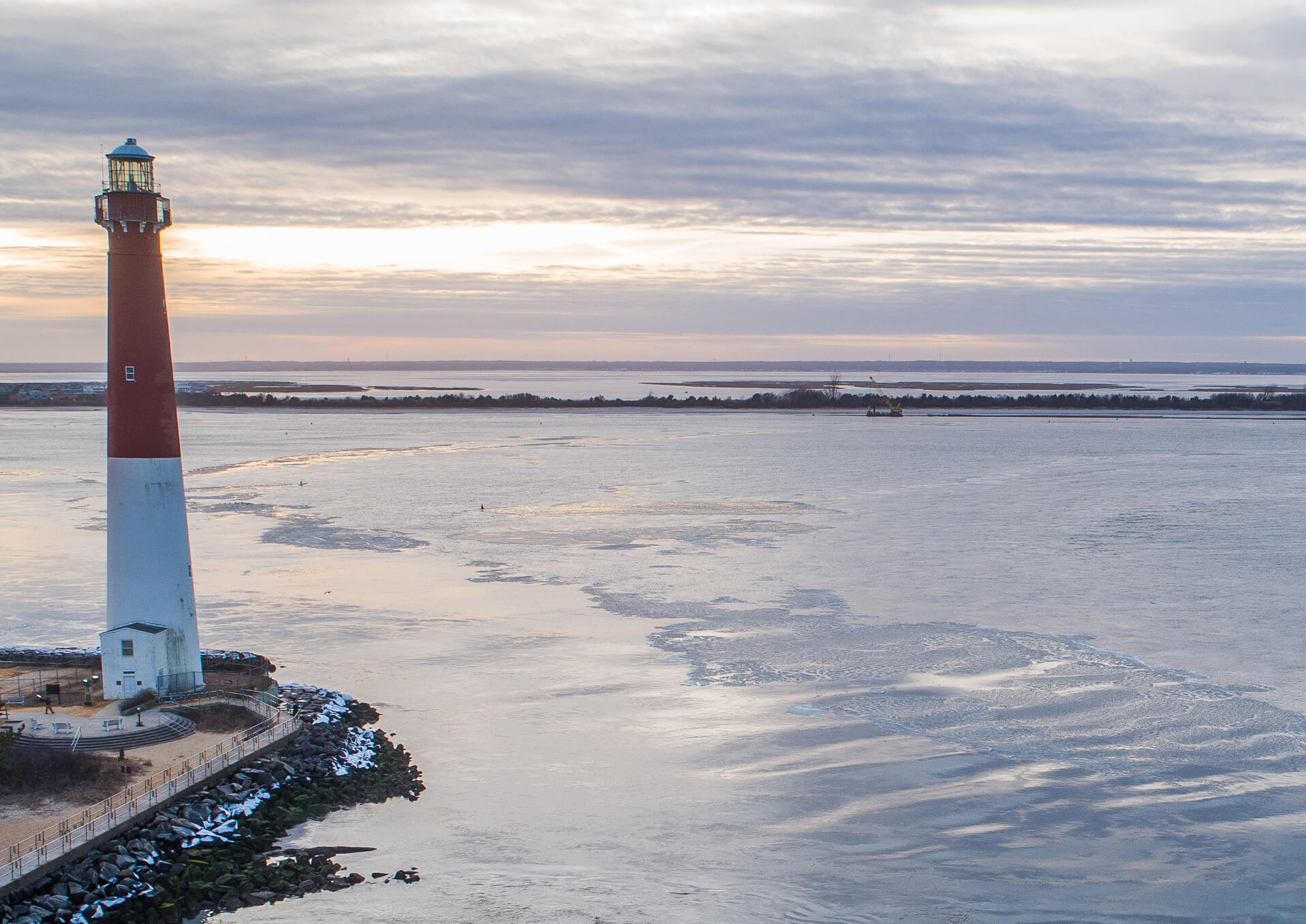

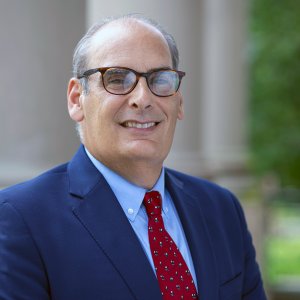 Randall Abate is the inaugural Rechnitz Family/Urban Coast Institute endowed chair in marine and environmental law and policy and a tenured full professor in the Department of Political Science and Sociology. He teaches courses in domestic and international environmental law, constitutional law, and animal law. Professor Abate joined Monmouth in 2018 with 24 years of full-time teaching experience at six U.S. law schools, most recently from Florida A&M University College of Law in Orlando, where he also served as associate dean for academic affairs. Professor Abate has published five books and more than 30 law journal articles and book chapters on environmental and animal law topics, with a recent emphasis on climate change law and justice. Early in his career, Professor Abate handled environmental law matters at two law firms in Manhattan.
Randall Abate is the inaugural Rechnitz Family/Urban Coast Institute endowed chair in marine and environmental law and policy and a tenured full professor in the Department of Political Science and Sociology. He teaches courses in domestic and international environmental law, constitutional law, and animal law. Professor Abate joined Monmouth in 2018 with 24 years of full-time teaching experience at six U.S. law schools, most recently from Florida A&M University College of Law in Orlando, where he also served as associate dean for academic affairs. Professor Abate has published five books and more than 30 law journal articles and book chapters on environmental and animal law topics, with a recent emphasis on climate change law and justice. Early in his career, Professor Abate handled environmental law matters at two law firms in Manhattan. Steven Bachrach became the dean of the School of Science at Monmouth University in 2016. Previously, he was the Dr. D. R. Semmes distinguished professor of chemistry at Trinity University in San Antonio, Texas. He also served terms as the assistant vice president for special projects, and Department of Chemistry chair. He began his academic career at Northern Illinois University where he earned the rank of full professor. Bachrach was an American Council on Education (ACE) fellow at the University of Redlands during the 2014-15 academic year. He maintains an active research program in computational organic chemistry, having published with dozens of undergraduate students. Dr. Bachrach has authored more than 150 publications, including his book Computational Organic Chemistry, and served as editor-in-chief of the Internet Journal of Chemistry. His latest book, Thinking Like a Physical Organic Chemist, is scheduled to be published next year with Oxford University Press. Bachrach is the recipient of more than $2 million in grant funding, most notably from the National Science Foundation, American Chemical Society, and the Welch Foundation.
Steven Bachrach became the dean of the School of Science at Monmouth University in 2016. Previously, he was the Dr. D. R. Semmes distinguished professor of chemistry at Trinity University in San Antonio, Texas. He also served terms as the assistant vice president for special projects, and Department of Chemistry chair. He began his academic career at Northern Illinois University where he earned the rank of full professor. Bachrach was an American Council on Education (ACE) fellow at the University of Redlands during the 2014-15 academic year. He maintains an active research program in computational organic chemistry, having published with dozens of undergraduate students. Dr. Bachrach has authored more than 150 publications, including his book Computational Organic Chemistry, and served as editor-in-chief of the Internet Journal of Chemistry. His latest book, Thinking Like a Physical Organic Chemist, is scheduled to be published next year with Oxford University Press. Bachrach is the recipient of more than $2 million in grant funding, most notably from the National Science Foundation, American Chemical Society, and the Welch Foundation.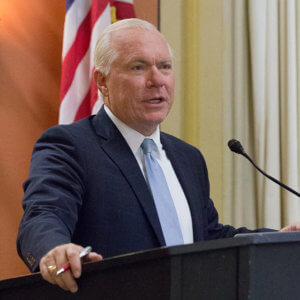 Tony MacDonald is director of the Monmouth University Urban Coast Institute (UCI). He was previously the executive director of the Coastal States Organization (CSO) from 1998-2005. CSO, based in Washington, D.C., represents the interests of the governors of the nation’s 35 coastal states and territories on coastal and ocean policy matters. Prior to joining CSO, Tony was the special counsel and director of environmental affairs at the American Association of Port Authorities, where he represented the International Association of Ports and Harbors (IAPH) at the International Maritime Organization on negotiations on the London Convention. Tony has also practiced law with a private firm in Washington, DC, working on environmental and legislative issues, and served as the Washington, DC, environmental legislative representative for the mayor of the City of New York.
Tony MacDonald is director of the Monmouth University Urban Coast Institute (UCI). He was previously the executive director of the Coastal States Organization (CSO) from 1998-2005. CSO, based in Washington, D.C., represents the interests of the governors of the nation’s 35 coastal states and territories on coastal and ocean policy matters. Prior to joining CSO, Tony was the special counsel and director of environmental affairs at the American Association of Port Authorities, where he represented the International Association of Ports and Harbors (IAPH) at the International Maritime Organization on negotiations on the London Convention. Tony has also practiced law with a private firm in Washington, DC, working on environmental and legislative issues, and served as the Washington, DC, environmental legislative representative for the mayor of the City of New York.